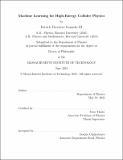Machine Learning for High-Energy Collider Physics
Author(s)
Komiske III, Patrick Theodore
DownloadThesis PDF (16.47Mb)
Advisor
Thaler, Jesse
Terms of use
Metadata
Show full item recordAbstract
Fundamental physics, in particular high-energy collider physics, seeks to understand the natural world at the smallest scales, leading experimentally to the creation of large, complex datasets. Machine learning comprises a powerful set of statistical and computational tools enabling comprehensive exploitation of data. In this thesis, I develop machine learning methods to facilitate cutting-edge analysis techniques in particle physics. I model collider events as point clouds and develop neural network architectures that respect the inherent permutation symmetry and variable number of particles of an event, with infrared safety naturally incorporated. I further design a procedure that uses high-dimensional classifiers to achieve full-phase space, unbinned unfolding of all observables simultaneously. In the second part of this thesis, I define a distance metric between collider events based on optimal transport that allows for a rigorous construction of "event space" and its corresponding geometry. Using public datasets provided by the CMS collaboration, I explore this metric on a dataset of real jets, demonstrating its viability as an experimental method as well as the value of public collider data in benchmarking new techniques.
Date issued
2021-06Department
Massachusetts Institute of Technology. Department of PhysicsPublisher
Massachusetts Institute of Technology